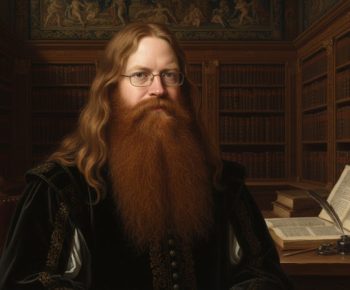
I grew up in a Roman Catholic home and was baptized as a baby. Church was part of my earliest memories, candles, stained glass, and a quiet sense of awe that I didn’t really understand yet. But when my parents divorced, all of that stopped. For most of my childhood, I didn’t go to church at all.
It wasn’t until years later, after a lot of personal turmoil, that I ended up living with my mother again. Through her gentle faith, I started going back to church.
Coming Back to Faith
I lived in Southern California during a time when Christianity was everywhere, Calvary Chapel, Harvest Crusades, BIOLA University, and the Christian Research Institute were all over the radio and TV. I was drawn into it and started attending Calvary Chapel West Covina, pastored by Raul Ries.
Back then, I was a firm believer in everything dispensational, rapture charts, the tribulation, and all the end-times talk. That’s what most of the people around me believed, too. And if you didn’t believe it, you were considered a “lesser Christian.”
Over time, I noticed something that didn’t sit right. The sermons began to feel more like arguments than teaching. Disagreeing with anything, even small points, wasn’t welcome. It felt closed off. Eventually, I left, still hungry to understand the truth for myself.
A Whole New World at Grace Community Church
My next stop was Grace Community Church in Sun Valley, California. That move changed everything.
If Calvary Chapel was a small workshop, Grace Community was a full-blown academy. The church bookstore became my classroom. It was stocked with seminary-level books from The Master’s Seminary, and I dove in headfirst.
I read Robert L. Thomas, Richard Mayhue, John MacArthur Jr., and the Puritans: Thomas Watson, John Bunyan, and others. For the first time, I realized how much more there was to learn. I started seeing how different Christians approached theology without twisting Scripture to fit their preferences. Those were some of the best years of my spiritual life.
I like to joke that Grace Community was my “poor man’s seminary,” but it really was. It taught me that faith doesn’t need to fear questions.
The Baptist Years: Learning the Hard Way
After moving, I joined a few Baptist churches. Some were wonderful and sincere, but others were so divided and militant that they nearly pushed me out of church altogether.
At one “fundamentalist” Baptist church, I confronted the pastor for using inappropriate language during a service. It turned into a heated argument, and he threw me out. At that point, I was just tired, tired of fighting, tired of pride, and tired of churches splitting hairs while forgetting love.
Still, that season taught me something important: truth matters, but so does humility.
Discovering the Reformed Faith
During that time, I couldn’t stop studying. I kept ordering books from Presbyterian & Reformed Publishing and Gospel Missions. One day I picked up The Gospel of the Kingdom by Philip Mauro, and that book changed my life.
For the first time, I began to see how the Bible fit together as one story, not divided into eras or systems, but centered on Christ. I started reading the Westminster Confession of Faith, the catechisms, and the writings of Calvin, Warfield, Hodge, Berkhof, Ames, and Watson.
Though I still respected my Baptist roots, I eventually became convinced of Presbyterian theology. I attended an Orthodox Presbyterian Church (OPC) for a time. The doctrine was solid, but the community life was cold. There was little charity or outreach. When the church eventually closed for lack of members, I moved on again, this time to the Presbyterian Church (U.S.A.).
Finding Grace in Unlikely Places
At Calvary Presbyterian Church in Riverside, California, I saw something I hadn’t seen before. This church didn’t just preach the gospel, it lived it. They opened their doors to the poor, hosted AA meetings, clothed the needy, and fed the hungry. It was messy, but it was beautiful.
I had always been taught to measure a church by its doctrine alone. But here, I saw the gospel with hands and feet. It reminded me that truth and compassion don’t have to be at odds.
Later, I attended Westminster Presbyterian in Pasadena and then Providence Presbyterian (PCUSA) after moving to Virginia. Each season shaped me in some way, teaching me both what to hold onto and what to let go of.
Looking Back and Looking Forward
When I look back over my life, I see a trail of churches, books, and lessons. I’ve been Catholic, evangelical, Baptist, Reformed Baptist, Presbyterian, and a few things in between. I’ve seen pride disguised as doctrine and grace hidden under tradition. But I’ve also seen God’s patience, leading me step by step toward a deeper understanding of His truth.
If I could go back, I’d tell my younger self to start with the Apostles’ Creed, the Westminster Standards, and the great confessions of the Church. They would have given me solid footing when everything else felt unstable.
That’s why I created Apostles-Creed.org to help others find that foundation sooner than I did. You don’t have to wander through endless denominational confusion to know what you believe. The truth is already there, written, tested, and confessed by generations of believers before us.
My hope is simple: that every Christian who visits the site will grow stronger in faith, wiser in doctrine, and more anchored in the Word of God. Don’t get stuck in one narrow corner of Christianity. Read the Church Fathers. Study the confessions. See what God has preserved through the centuries.
The answers to life’s biggest questions aren’t hidden.
They’re waiting in the writings of the Church and in the pages of Scripture.